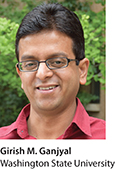 Q: What is your current position and what type of work do you do?
Q: What is your current position and what type of work do you do?
A: I am a faculty member in the School of Food Science (SFS) at Washington State University (WSU). I have extension and research responsibilities in the areas of food processing and food safety. In my current role, I assist food processing companies of all types and sizes with creating safe, value-added food products. The services that I provide include developing and processing new value-added foods, complying with food safety regulations, and assisting in process improvements. These services include assisting individual companies with their specific needs and addressing broader industry issues through research projects.
Along with these services, SFS offers numerous training opportunities in the areas of food processing and food safety. All of these events are offered in collaboration with numerous experts. One of the major workshops SFS offers is our annual Food Safety and Sanitation (FSS) Workshop. This is a regional workshop that is aimed at elevating the food safety culture within the broader food industry. This is a massive effort and involves strong collaborations with the food industry and regulatory agencies in the region.
Q: When and how did you first decide you wanted to work in cereal grain science?
A: It goes way back to when I was in high school. When I first came across extruded breakfast cereal products, I was fascinated. That fascination sparked my interest in working with grains. Ever since then, I have enjoyed working with grains and continue to do so.
Q: How have you been involved with the AACCI — Cereals & Grains Association? How has your involvement enriched your career?
A: I started working with AACCI as a student member back in 2001. At my first meeting I presented my Ph.D. research work and participated in different student activities. Since then, I have always enjoyed attending AACCI meetings. It has helped me in tremendous ways through networking and the various ways in which AACCI shares technical information with its members and the society in general.
Q: In 2019, Cereal Foods World (CFW) will focus on the global food system (GFS). What is your perspective on how global societal and technology trends are affecting cereal science and the cereal grain industry overall? How will cereal scientists need to adapt to these global trends?
A: The world is becoming smaller and smaller due to the tremendous advancements in communication and transportation technologies. This impacts every aspect of our lives, including food. Along with this, the explosion of the global population is putting tremendous pressure on food sources. Cereal scientists and other supply chain professionals have great opportunities to address these challenges. Cereal scientists will need to work collaboratively across the supply chain, from the breeding of new varieties to the making of finished cereal foods, to meet future demands.
Q: This issue of CFW explores how global food safety and security practices are evolving in the context of the GFS. Do you have any perspectives concerning the challenges and opportunities associated with the global expansion of the food chain and the dynamics of the global food trade?
A: There will be significant challenges, including, but not limited to, 1) meeting the ever-increasing demand to feed an increasing global population; 2) significantly reducing the land and soil resources that are used to produce foods; and 3) alleviating pressure on natural resources such as water to produce food. These challenges are also great opportunities for cereal scientists to address. I strongly believe that with the technological advances we have made in the past 10–20 years, along with human ingenuity and ability, we will successfully address these challenges.
Q: What’s next for you?
A: I have enjoyed working in the area of cereal grain processing and will continue to do so. So far, I have learnt so much, yet feel there is so much left to learn and do. My specific areas of work include extrusion processing, ingredient functionality, and the safety of these food products. I see a lot ahead that I look forward to contributing to the field and the society.
